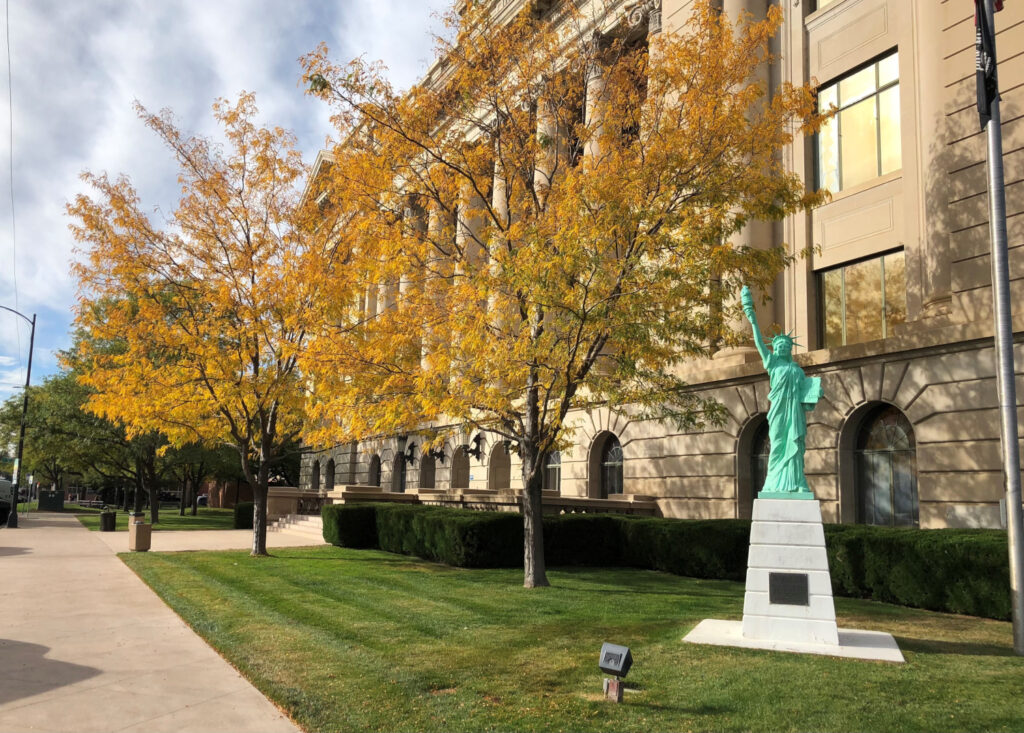By Jeffrey A. Roberts
CFOIC Executive Director
In a test of Colorado’s new law governing the public release of certain police body-worn and dashboard camera footage, a Weld County District Court judge Thursday ordered the immediate disclosure of video from a June incident in which a Greeley officer allegedly used a chokehold during an arrest.
Although the lawyer for Officer Kenneth Amick contended the footage will jeopardize his client’s right to a fair trial — and prosecutors supported that stance – Judge Vincente Vigil agreed with a news media coalition that no evidence supports that argument.

“I’m not going to base the finding on mere speculation,” the judge said during a short hearing. “I don’t know what’s on this video. So it’s hard for me to find that this video is so prejudicial that it would be a violation of Mr. Amick’s constitutional rights to disclose this video to the public, as the statute indicates.”
Amick’s defense attorney, David Goddard, argued that the judge didn’t need to see the video to weigh Amick’s fair-trial rights against the public’s right to know. But Vigil was so adamant about his decision that he announced it before giving Rachael Johnson, the media coalition’s attorney, a chance to speak.
Johnson, a Colorado-based lawyer for the Reporter’s Committee for Freedom of the Press, had filed an objection to a protection order in late August, stating that “Coloradans have a significant interest in the disclosure of information about police officers who use excessive force, especially when an officer places a citizen in a chokehold or neck restraints.”
Amick, she wrote, hasn’t shown that public disclosure of the recordings — “purely factual information about the underlying incident” — would prevent him from receiving a fair trial. She cited numerous aspects about the June 7 incident, already reported by the news media, which “do not begin to approach the extent or nature of pretrial publicity that courts have found may be prejudicial to a criminal defendant’s Sixth Amendment rights.”
Colorado’s new body-cam and dash-cam footage law, enacted by House Bill 21-1250 and Senate Bill 20-217, requires the release of unedited video and audio recordings of incidents “in which there is a complaint of peace officer misconduct” within 21 days after a request is made. If the video “would substantially interfere with or jeopardize an active or ongoing investigation,” the disclosure can be delayed until 45 days from the date of the allegation of misconduct. A prosecuting attorney must explain in writing why the delayed release is justified, and that statement must be released to the public when the video is released.
The new law also permits a defendant such as Amick to file a constitutional objection to the release of a recording.
Amick was charged with second-degree assault after two other officers alleged that he used a chokehold, in violation of a 2020 state law, on a man accused of threatening to burn down a city government building. Goddard said he disputes a finding by the judge that the defense must show evidence that overcomes the body-cam law’s “statutory presumption of release.”
“With respect to an offer of proof, I can tell the court the body-worn camera video in this case records the entire incident … between my client and the alleged victim in this case,” Goddard said. “I guess I don’t know that the court needs to see what’s on the video, necessarily, to make a ruling on whether or not it should grant the request for the protection order.
“What’s at issue here,” he added, “is that you have critical evidence in a case that should not be disseminated outside of the courtroom prior to trial.”
The judge said Goddard presented “assertions” that releasing the video would impinge on Amick’s constitutional rights, but “the court does not have any affidavits with respect to the facts of this case, the court does not have the body-cam footage at issue.”
Calling Goodard’s arguments “merely speculative at this point,” Vigil said the defense will get a chance to address fair-trial issues during jury selection and can argue for a change of venue “if we get that far.”
Amick is scheduled to be arraigned Oct. 22.
The media coalition represented by Johnson includes FOX31, 9NEWS, Denver7, CBS4, the Associated Press, The Gazette in Colorado Springs and The Denver Gazette.
Follow the Colorado Freedom of Information Coalition on Twitter @CoFOIC. Like CFOIC’s Facebook page. Do you appreciate the information and resources provided by CFOIC? Please consider making a tax-deductible donation.




